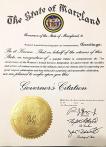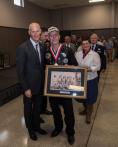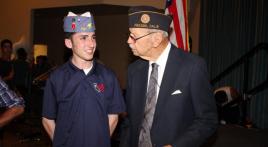My basic training in the summer and fall of 1970 was at Folk Polk, Louisiana, which puts us in Company A, Fourth Battalion, Second Training Brigade decided must have been selected for us because the weather and landscape most closely resembled the jungles of Vietnam.
On one of the first days of training, I ignored a warning that friends and older veterans had given me. “Whatever you do,” I had been warned, “do not raise your hand when your Company is asked during formation for volunteers to be ‘drivers,’ you will end up driving a wheelbarrow!”
Although I respected the veterans who had so advised me, when Drill Sgt. Sam Stack asked for volunteers, something inside told me that he was being sincere. I was not unpleasantly surprised. Sgt. Stack sent me and three other buck private volunteers over to headquarters to take an exam for our Army driver’s license, and I passed the test. G
From that point forward, every few days, I would be sent to the motor pool to check out an aid vehicle or water truck to follow my marching comrades miles out to the rifle range, PT course, or another exhausting destination.
It was not all fun and relaxation to be an Army driver. Sometimes I would be ordered to take work crews out to jobs sites for work like brush clearing, hole digging, and similar tiring tasks in the 90-plus degree heat.
At first, I tried to sit in the cab of the truck while the work was being done. After all, I had not misbehaved or otherwise earned the misfortune of being assigned to the labor force for the job.
My attempts, to remain in the ivory tower of my truck cab, lasted at most about 20 minutes, until I was shamed into picking up a shovel or saw and pitching-in like a team player must do when his teammates need help.
But all-in-all that Army driver’s license served me well during and after basic, allowing me to enjoy a few weeks of light duty as the private driver for my Battalion Commander.
I did get a lot tougher in basic, with my strength and endurance boosted markedly. My crowning achievement, to gain the respect of my fellow soldiers, was the Gas Chamber.
GI's, at least in those days, were being taught the hard way to value the use of a gas mask. To convince us not to chuck our masks aside when trudging through rice paddy (as too many WWII soldiers had done before suffering the effects of toxic Nazi gassing), we all were expected to go into the Gas Chamber and experience a few seconds of breathing CS gas without the mask over our face.
After marching with our gear, including gas masks to the chamber, we entered the chamber in groups of a dozen or so, and stood in a circle with our drill sergeant in the middle. When your name was called, you were supposed to remove your mask and respond when asked three separate questions: your name, rank and service number. After accurately responding, each trainee was then allowed to bolt for the door; coughing and gagging.
My problem that day was my just-developing hearing loss (a service-connected disability which eventually worsened to the point that I was grounded from flight duty but earned the right to receive outstanding VA care). When Sgt West called the name “Watson,” I thought he said “Wasson.” So both Pvt Watson and I took off our masks at the same time. I saw my mistake and started to put my mask back on, but Sgt West ordered me to “keep it off.”
He then took his time getting Pvt. Watson to recite his name, rank, and SN, who then bolted to the door and collapsed outside, hacking and weeping from the tear gas. Meanwhile, I was standing there in the dwindling circle of soldiers with my mask down at my side, feeling as if I was breathing in actual flames of fire. But I told myself I was going to turn the mistake in a victory.
Sgt. West then turned to me and looked at me with a wry smile, inquiring: “Name?” I forced myself to respond slowly and distinctly. “Wasson,” I replied. “Are you sure, soldier?” Sgt West asked, referring to my premature mask removal. After also slowly enunciating my rank and service number (exaggerating the space between each digit), I believe that I gained Sgt. West’s respect. He rewarded me by ordering me to “hit the door,” expecting me to scramble for the exit. I did not do so. Instead, I strolled very deliberately toward the door; stopped before exiting; turned a clean about-face to offer Sgt West a respectful salute; then slowly walked outside and down some steps, where the rest of our platoon was waiting, still suffering the effects of the gas (having learned a lesson about the value of weighty gear).
When the word spread about my experience, I was honored by a hearty round of applause and back-slapping (which was well-meaning but did not help my scorched lungs feel any better).
I developed some confidence during basic training by successfully navigating the “confidence course.” But, after surviving and thriving during the Gas Chamber experience, I was ready for anything the enemy could throw at me.
Thank you Sgt West. And you too, Sgt Stack.
Roy D. Wasson, Miami, Florida




